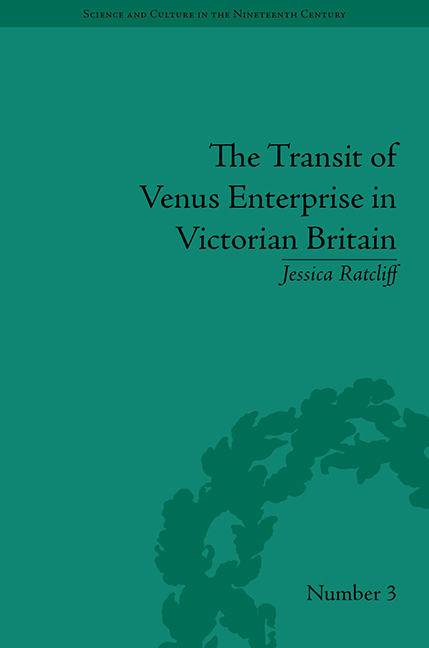Book contents
- Frontmatter
- CONTENTS
- Acknowledgements
- List of Illustrations
- Dedication
- Introduction
- 1 The Precedent: Transit of Venus Expeditions in 1761 and 1769
- 2 Big Science in Britain c. 1815–70
- 3 Noble Science, Noble Nation: The Establishment of Transit Programmes in Britain and Abroad
- 4 Inside Greenwich: The Preparations for 1874
- 5 The Expeditions
- 6 The Outcome
- Conclusion
- Epilogue: The Transit of 1882
- Notes
- Works Cited
- Index
6 - The Outcome
- Frontmatter
- CONTENTS
- Acknowledgements
- List of Illustrations
- Dedication
- Introduction
- 1 The Precedent: Transit of Venus Expeditions in 1761 and 1769
- 2 Big Science in Britain c. 1815–70
- 3 Noble Science, Noble Nation: The Establishment of Transit Programmes in Britain and Abroad
- 4 Inside Greenwich: The Preparations for 1874
- 5 The Expeditions
- 6 The Outcome
- Conclusion
- Epilogue: The Transit of 1882
- Notes
- Works Cited
- Index
Summary
For a few months after the transit, newspapers and journals regularly followed updates from the expeditions. Airy apparently sent updates to the press; one list of places to which transit of Venus information should be sent included, among government offices and national observatories, the following: Reuters’ office, the Times, the Daily News, the Standard, the Daily Telegraph, the Athenaeum, Nature, the Smithsonian Institute, the Manchester Courier, the Pall Mall Gazette, the Echo and the Globe. But, in general, press coverage of the enterprise did not last long after the day of the transit. There were a few last attempts to draw some public reaction by reporting spectacular failures, such as a report in the Daily News from mid-January 1875. The supposed disaster caused by the loss of observations in New Zealand and Kerguelen was contrasted with the supposed successes of Lord Lindsay's operation, especially his choice of the ‘almost perfect, theoretically’ long-focus photographic method, which, as the paper suggested, Airy declined out of pride to adopt:
The occasion was far too important to be played with; and still less excusable than mere carelessness would be any neglect arising from unwillingness to advance schemes suggested by others. We are thinking rather of the future judgment of the scientific world than of any immediate or official reprehension – the latter, indeed, official scientists are secured from in this country.
Proctor had written in the Daily News before and he may well have been the author of this piece; the concluding jab at Airy's alleged immunity is characteristic of his style. Either way, it was far too early to make any statements about the relative successes of each country, or about how the British government would react to any failures. While it was true that the Americans had had slightly better luck with the weather, other factors would be much more important in deciding the fate of the research programmes.
- Type
- Chapter
- Information
- The Transit of Venus Enterprise in Victorian Britain , pp. 119 - 146Publisher: Pickering & ChattoFirst published in: 2014



